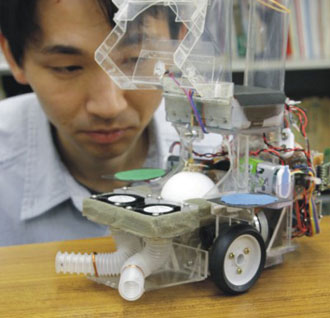A University of Tokyo researcher has shown that silk moths can quickly learn to steer a small electric car toward a desired destination, according to a recent article on Wired.com.
The experiment was conducted by Dr Noriyasu Ando to test whether silk moths can train their motor system to steer an electric robot toward a desired destination. The experimental setup comprised a small electric robot that could be steered by turning a super-light polystyrene ball like the track-balls that substitute for mice on some laptops. To provide a desired destination Ando dabbed the pheromone of a sexually available female silk moth onto the end of a tube. A small fan was used to blow the scent toward a male moth that had been gently tethered to the top of the ball.
It didn’t take long for each of 14 silk moths to figure out how to use their legs to turn the ball to steer the robots toward the source of the pheromone.
To see how well the moths could adapt to steering a less straightforward robot, Ando introduced a turning bias by making the electric motor on one side of the robot stronger than the other, causing it to veer if steered straight ahead. All the moths were able to adapt their leg motion to compensate for the bias to reach the pheromone source.
Aside from illustrating the moths’ sophisticated motor skills and their sense of smell — thought to be the most sensitive among all known creatures — Ando’s study suggests the possibility of genetically adapting silk moths to guide robots toward narcotics, gas leaks, chemical spills or even hidden bombs or biological weapons. More generally, it shows the feasibility of mating biological and mechanical systems to achieve capabilities beyond those possible with purely manmade devices.


